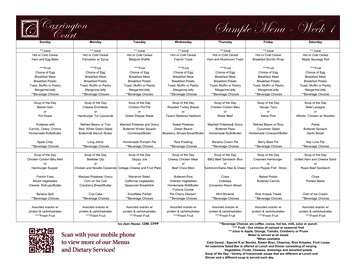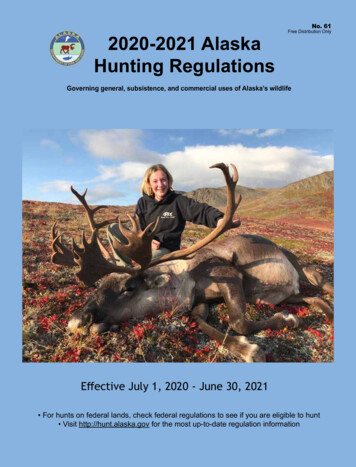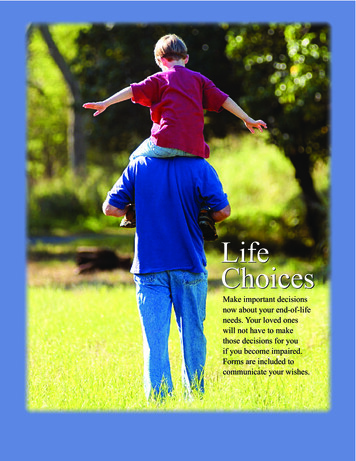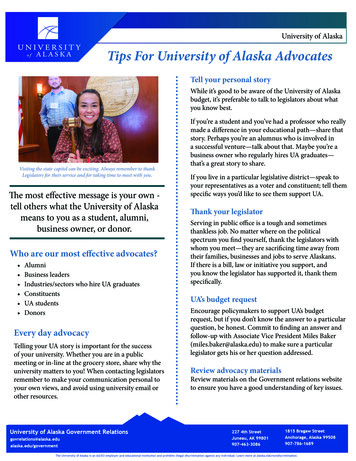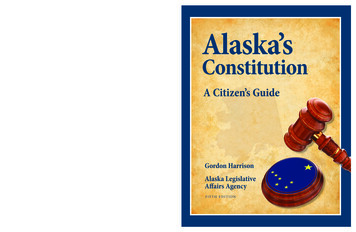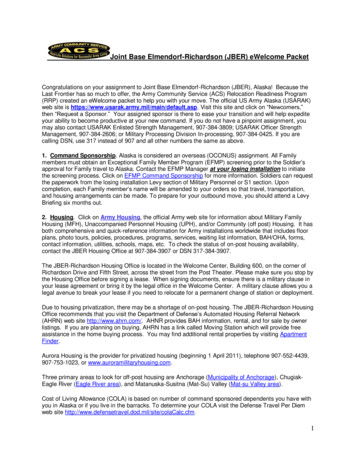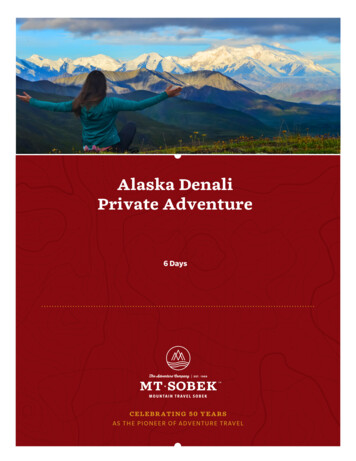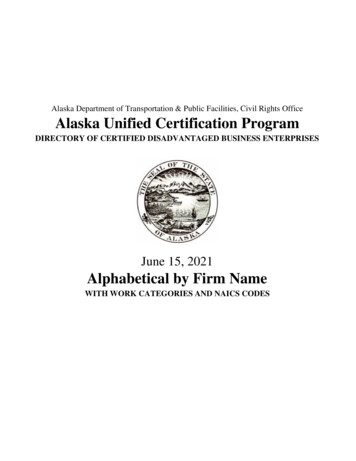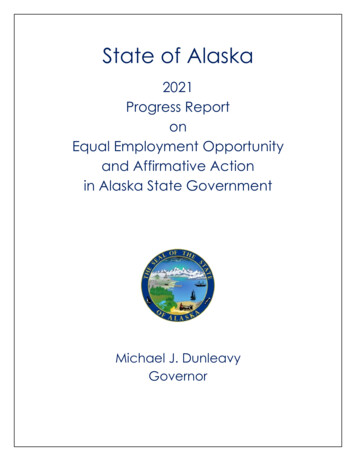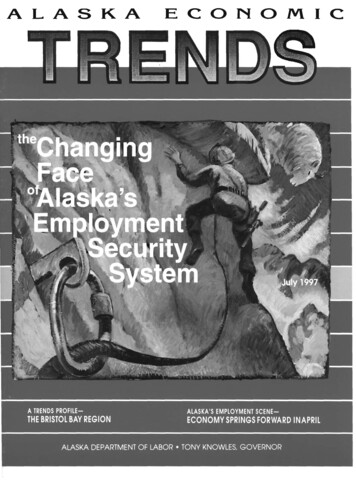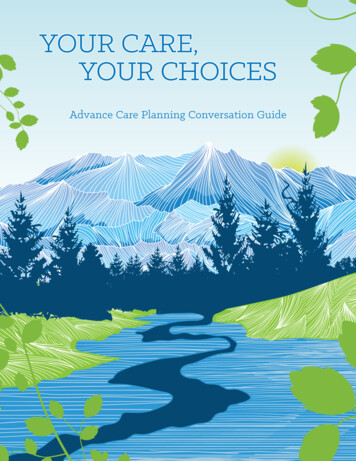
Transcription
YOUR CARE,YOUR CHOICESAdvance Care Planning Conversation Guide
Table of ContentsWhat is Advance Care Planning? . . . . . . . . . . . . . . . . . . . . . . . . . . . . 1Our Stories. . . . . . . . . . . . . . . . . . . . . . . . . . . . . . . . . . . . . . . . . . . . . . 2-4What is an Advance Health Care Directive?. . . . . . . . . . . . . . . . . . . 5What is a Health Care Agent?. . . . . . . . . . . . . . . . . . . . . . . . . . . . . . . . 6What are Instructions for Health Care?. . . . . . . . . . . . . . . . . . . . . . . 7What is Cardiopulmonary Resuscitation (CPR)?. . . . . . . . . . . . . . . 8What is Life Support?. . . . . . . . . . . . . . . . . . . . . . . . . . . . . . . . . . . . . . . 9What is Artificial Nutrition?. . . . . . . . . . . . . . . . . . . . . . . . . . . . . . . . 10How do I Make My Advance Health Care Directive Legal?. . . . 11How do I Share My Wishes with Others?. . . . . . . . . . . . . . . . . . . . 12Know Your Rights . . . . . . . . . . . . . . . . . . . . . . . . . . . . . . . . . . . . . . . . . 13
What is Advance Care Planning?Being Preparedis ImportantLiving in Alaska, we spend a lot of time gettingprepared. We prepare for fishing, hunting,weather, winter, school and travel. Being preparedis important because it helps us to plan for thethings that may or may not happen—just incase. Thoughtful and careful preparation helpsprotect us; it also gives peace of mind to us andour families. The same is true when planning formedical care.This conversation guide can be used to learnabout Advance Care Planning, and as a talkingtool for you, your family and health care providers.This conversation guide is not to be used as legaladvice in any situation. You are empowered tomake your own health care choices. Living life tothe fullest can mean different things to differentpeople, and it is important to think and talk aboutwhat it means to you.The stories on the next three pages can be usedto help you think and talk about what life meansto you in the event that you became seriously ill orbadly hurt. Although the stories are made up anddo not represent real people, these are commonhealth care situations where Advance CarePlanning can help you be prepared.Advance CarePlanning is one wayto be prepared for theunexpected. AdvanceCare Planning lets yourfamily, friends andhealth care team knowhow you wish to becared for if you everbecome seriously ill orbadly hurt. What does AdvanceCare Planning meanto you? How could AdvanceCare Planning behelpful for you andyour family? Do the people whoare important to youknow your healthcare wishes?“One must be wise in knowing what to prepare for and equallywise in being prepared for the unknowable.”Printed with permission from Always Getting Ready / Upterrlainarlutaby James H. and Robin Barker1
Be Prepared for the UnexpectedDavid was a big, strong andhealthy man, who thrived in thecommunity where he was born. Hewas always busy hunting, fishingand enjoying nature. David loved hisfamily, church and community. Hewould help anyone in need. One day,David and his brother went fishing.During the long boat ride, David didnot see a log hidden just under thesurface of the water until it was toolate. The boat hit the log going fullspeed, knocking David off his feetand slamming him into the side ofthe boat.David woke up lying in thebottom of the boat, bleeding froma cut on his head. His brother wascrouched over him, calling his name.He told his brother he had a reallybad headache.David’s brother drove the boatquickly back to land and brought himto the clinic for a checkup. While thehealth aide was stitching up his head,David started to have a seizure andwouldn’t wake up. The health aidecalled for an emergency paramedic,but on the way to the hospital Davidstopped breathing. A breathing tubewas put into David’s windpipe.David was rushed to the hospitalfor tests and was connected to amachine to help him breathe. Onetest showed massive bleeding in hisbrain. Doctors told David’s familymembers that they didn’t think hewould survive his injury. They said ifhe did recover, he probably would notknow himself or his family. He wouldlikely need around the clock care thatwould make it impossible for him tolive at home again and he would needa feeding tube to keep him alive.David’s family was stunned. Theydidn’t know what to do. They lovedhim very much, but didn’t want himto suffer.If you had an accident and weren’t expected to wake up, whatwould you want your family and your health care team to do?2
Be Prepared for the JourneyMary was diagnosed with coloncancer two years ago and hadsurgery to remove the tumor. Duringa checkup for a cold that wouldn’t goaway, doctors found the cancer hadcome back and spread into her lungs.Mary was told by the oncologist thatthere was no cure.schedule. I don’t want to spendthe rest of my life going to doctorappointments. I have a life left to live.I don’t want to waste so much of mytime and energy and be too sick togo home. I don’t want to die in thehospital. For what? When it’s mytime, it’s my time. This is my decision.”Mary thought about her father, whodied of cancer five years earlier. Hetraveled back and forth to Anchoragefor cancer treatments. One day, herfather made the decision to stopcancer treatment and stay at homewith his family even though he knewhis decision might shorten his life.Mary smiled when she rememberedhim. He was so happy to be homesnuggling with his grandkids on thecouch and riding with his son to checkthe fishing nets. He was enjoying hislife and was truly at peace with hischoices. He died shortly after theholidays, but Mary was grateful fortheir time. It meant so much to her.At the time, Mary was so angry at herfather! She felt like he was giving up.He gathered the family together andspoke quietly.“I’m tired of all of this,” he said. “I justwant to be home with my grandkids.Sleeping in my own bed, eating myNative food and keeping my ownShe thought about her cancertreatment and wondered how herjourney would look. What wasimportant to her? What did shewant to do before she got too sick?Where did she want to be? And,more importantly, when wasenough, enough?If you were diagnosed with an illness that couldn’t becured, but could be managed for a period of time, whatwould be important to you?3
Be Prepared for the TransitionJohn was a respected village Elder.His culture was so important tohim. He loved to dance, tell storiesand teach his language and thetraditional ways of his ancestors. Thecommunity depended on John for hiswisdom, knowledge and position as apeacekeeper.Sadly, John suffered from a bad heartand lungs over the past 20 years.Every year, he had more and moreclinic visits. He was staying overnightat the hospital and sometimes he wasin for weeks. The doctors tried to helphim feel better with medicine, butJohn still struggled. He was havingmore trouble breathing. Sometimesit made him anxious. Even on shortwalks he had to stop and catch hisbreath. He was tired all the time and itseemed like he was the first to catchevery cold in the village. His healthworried him.John was sad because he couldn’tdo the things that he loved to doanymore. He was old and he liveda good long life, but John worriedabout his family, his village and all theknowledge that he held. Who wouldwatch over the village? Who wouldteach the ways of the Elders tothe children?One night, John’s breathing was reallybad. His home breathing treatmentsweren’t helping. His wife was scared.John knew he was very sick. Thelast time he went to the hospital thedoctor told him if he got sick again,he might need a breathing machine.John wondered if he went to thehospital, would he ever make it backout? John loved his life and his family,but he didn’t know what to do.As you grow old and your body starts to get tired,what will be most important to you?4
What is an AdvanceHealth Care Directive?An Advance Health Care Directive, the form youfill out for Advance Health Care Planning, can bewritten or spoken. When filled-out properly, anAdvance Health Care Directive becomes a legalrecord of your medical choices. An AdvanceHealth Care Directive can be used to help yourfamily and health care team get you the healthcare you want. An Advance Health Care Directiveprotects your health care rights and makes yourwishes known. This workbook will guide youthrough an Advance Health Care Directive andhelp you create your own.There are two parts to an Advance Health CareDirective that will be explained in this booklet:· Part I: Choosing a Health Care Agent, alsoknown as a Durable Power of Attorney forHealth Care Decisions· Part II: Instructions for Health Care, sometimescalled a living willImportant things to know about AdvanceHealth Care Directives:· Anyone age 18 and older may fill out anAdvance Health Care Directive· Once completed, your Advance Health CareDirective should be reviewed every year to makesure it still represents your wishesAn Advance HealthCare Directive is a setof medical instructionsthat communicatesyour health carewishes to your medicalproviders and thepeople who areimportant to you. Have you everknown someonewho had a seriousaccident or illnessthat left them unableto make medicaldecisions or speakfor themselves? What was thatexperience like? If you were in asimilar situation,would you havedone anythingdifferently?· If you need to make changes, you may make anew Advance Health Care Directive at any time5
PART I:What is a Health Care Agent?Your Health Care Agent does not have to be afamily member. They can be a close friend orneighbor. The person (or people) you choose asyour Health Care Agent should be someone:· Who knows you well and who can understandand follow your medical wishes· Who you trust to speak as your voice· Who can be easily reached by telephone· Who is age 18 or older and not your health careprovider or an employee of your health careprovider (unless related by birth, marriage oradoption)It is important for your Health Care Agent to beable to speak on your behalf. Your Health CareAgent should be able to answer ‘yes’ to thesequestions:· Is he or she willing to be my health care agent?· Does he or she fully understand my medicalwishes?· Can he or she make health care decisions for mein stressful situations, even if my medical wishesmay be different than his or hers?Consider choosing a different person as yourHealth Care Agent if they answered ‘no’ to any ofthese questions or if they seem uncomfortabletalking about your health care decisions.A Health Care Agentis someone who willtell your story if youcannot. This person isable to make healthcare decisions for youbased on what theyknow is important toyou. You may chooseone or more HealthCare Agents. Somequestions to askwhen thinking aboutchoosing your HealthCare Agent: Who knows youwell? Who can you trustto make your healthcare decisions evenif they disagree withyour wishes? How does thisperson handlestressful situations?Choose your Health Care Agent(s) on page 1 of the Advance Health Care Directive6
PART II: What are Instructionsfor Health Care?When completed, Instructions for Health Care,also known as a living will, can:· Protect your health care rights· Make your health care wishes known· Shelter your family from the burden of makingdifficult medical treatment decisions· Help your health care team treat you in thebest possible way according to your personalvalues, health care goals and wishesInstructions for Health Care document personalpreferences about quality of life as well asmedical treatments.Quality of lifeQuality of life means different things to differentpeople. The experiences, stories and culture ofevery person help define what is important tothem. For some people, quality is measured byfeeling well and being independent. For others,every minute of life is important, no matter howthey feel or what needs to be done to extendtheir life. It is also important to share where theyspend their last days of life and how they arecared for in their last days. How they wish tohonor their body after death may be importantand very personal choice.Instructions forHealth Care arespecific directionsabout medicaltreatments that youmay or may not wantif you are unable tospeak for yourself.Some questions to askwhen thinking aboutyour Instructions forHealth Care: What does quality oflife mean to you? What brings you joyand makes your lifeworth living? Is there anythingspecial you wantyour family andfriends to know?Make choices according to your health care goals, values and preferences onpages 2 and 3 of the Advance Health Care Directive7
What is CardiopulmonaryResuscitation?Cardiopulmonary Resuscitation (CPR) can belife saving for some people when their heartor breathing stops, such as in the event of coldwater drowning, electrocution or sudden heartattack. CPR is used to keep blood moving to theheart, lungs, brain and other vital organs. CPRincludes chest compressions, mouth-to-mouthor artificial breathing, medications and, in somecases, electrical shocks.CPR works best when:· You are young and healthy· It is initiated within a few minutes of the event· Whatever caused the event can be reversed orcuredCPR does not work well if:· You have chronic health problemsCPR is a medicalprocedure used whena person’s heart orbreathing stops. Somequestions to ask whenthinking about CPR: How successfulis CPR? Do you knowsomeone who hashad CPR? How do you thinkCPR could meetyour health caregoals?· You have a disease or illness that cannot becured· Your body is weakIf you receive CPR, you will most likely need to be sent to a hospital that hasadvanced medical services, such as an intensive care unit. CPR can lead tothe need for a breathing machine, critical care or long hospital stay. Seriousside effects may include brain damage, rib fractures and/or organ injury.Even when given to a healthy person, CPR does not always work.8Make choices about CPR on page 3 of the Advance Health Care Directive
What is Life Support?Life support treatments include any medicaltest, blood product, surgery, procedure, machineand/or medicine needed to help prolong life.Life support is often given in advanced hospitalsettings, like the intensive care unit. Sometimesa trial of life support is useful to see if your bodycan get stronger; however, each treatment hasrisks. Life support does not work well if your bodyis weak and shutting down due to chronic healthproblems or if you are dying. Clear communicationwith your Health Care Agent will help your doctorstreat you the best way possible according to yourpersonal values, health care goals and wishes. Ifyou choose not to have life support treatments,your health care team will still continue to providemedical care. This medical care will includemedical treatments focused on providing comfort.Common forms of life support:Mechanical ventilation — A machine, called a ventilator, thatbreathes for you so oxygen can move through your lungs.Mechanical ventilation is used when you are intubated.Intubation — A tube in your windpipe that allows a ventilatorto breathe for you if you cannot breathe by yourself.Medicines are often needed to keep you still and asleep forsafety while you are intubated. You will not be able to eat ortalk while intubated. Surgery for a permanent tube in yourneck may be needed if you are on mechanical ventilation for along period of time.Dialysis — Treatment used when your kidneys are not workingand cannot balance the water and waste in your blood. Adialysis machine is used to clean your blood and removewastes.Vasopressors — Medicines used to increase blood pressure.When blood pressure gets too low, vital organs do not getthe oxygen they need to survive. Vasopressors are giventemporarily to improve blood pressure.Antibiotics — Medicines that help fight infection. During acritical illness, antibiotics may need to be given directly intothe blood stream through an IV.Blood products — Given if your blood counts go too low dueto sickness or bleeding from an injury. Blood products includered blood cells, platelets and other important things that areneeded to transport oxygen and help stop bleeding. Bloodproducts are often donated by other people and are putdirectly in the blood stream through an IV.Life support is medicaltreatments used tomaintain life when oneor more vital organsshut down. Somequestions to ask whenthinking about lifesupport: Have you everknown someone whoneeded life support? What was that like? Is there ever a timewhen you would notwant life support?Make choices about life support treatments on page 4 of the Advance HealthCare Directive9
What is Artificial Nutrition?If there comes a time when you are not able tospeak for yourself and you cannot eat or drinksafely, artificial nutrition may be used to keepyou alive. Artificial nutrition can be given througha tube into your stomach (through the nose orsurgically inserted), intestines or vein. Receivingartificial nutrition through a permanent feedingtube can extend life for some, but may beharmful for others. Artificial nutrition may haveside effects including bloating, swelling, diarrheaand an increased risk for infections such aspneumonia.Artificial nutrition work best when:· It is needed for a short time to help recoverfrom a surgery, injury or sudden illness· You have lost your ability to swallow due to anillnessArtificial nutrition does not work well and may beharmful when:· You have chronic health problems and arenearing the end of life· You have a non-curable cancer or advanceddementiaArtificial nutritionis liquid food giventhrough a tube downthe nose, into thestomach, intestinesor vein. It can begiven to sustain lifefor short periods assomeone gets betteror for longer periodsfor someone who maynever get better. Somequestions to ask whenthinking about artificialfood and fluids: Do you know anyonewho has neededartificial nutrition? What was that like? Is there ever a timewhen you wouldnot want artificialnutrition?Make choices about artificial food and fluids on page 4 of the Advance HealthCare Directive10
How do I Make My AdvanceHealth Care Directive Legal?An Advance Health Care Directive is recognizedas a legal document in the State of Alaskawhen properly signed. An Advance Health CareDirective can be either witnessed or notarized.When using two witnesses to legalize yourAdvance Health Care Directive:· Both witnesses must be least age 18 or older· Neither witness can be your Health CareAgent· Neither witness can be your health careprovider or an employee of your health careprovider/clinicAND· At least one of the witnesses cannot berelated by blood, marriage or adoption· At least one of the witnesses cannot be abeneficiary of your money, property, shares orpermitsWhen using a Notary Public to legalize yourAdvance Health Care Directive:· Do not sign your Advance Health CareDirective until you are told to do so by theNotary Public· Be prepared to show identificationWhen you are ready,you can completean Advance HealthCare Directive. Afterit is filled out, signedand witnessed, itwill become legallyrecognized in theState of Alaska. Somequestions to ask aftercompleting yourAdvance Health CareDirective: Who should havecopies of yourAdvance Health CareDirective? Where should youkeep the originalcopy of yourAdvance Health CareDirective? What if you wantto make changes toyour Advance HealthCare Directive?Legalize your Advance Health Care Directive by signing page 5 of the AdvanceHealth Care Directive with two witnesses or a Notary Public11
How do I Share My Wisheswith Others? Talk to your family and friends about your choices and wishes Fill out an Advance Health Care Directive (ask your health care provider forhelp if needed) Sign your Advance Health Care Directive in front of two witnesses or aNotary Public to make it legal Give a copy of your Advance Health Care Directive to your Health CareAgent(s) and health care provider(s) Keep a copy of your Advance Health Care Directive at home in a safe placewhere it is easy to find Take a copy of your Advance Health Care Directive with you when you travelfor medical treatment Cut out the wallet card below and keep it with you so that others will knowabout your Advance Health Care Directive Look at your Advance Health Care Directive often to make sure it is still yourwishes. Make a new one if there are changes. If you make changes, make sureto tell your Health Care Agent(s) and give new copies to your health careprovider(s)I have given these people a copy of my completed Advance HealthCare Directive:NamesI have an Advance Health Care DirectivePhone numbersMy primary care provider is:Name:SignatureAddress:Please read these documents and/or discussmy wishes with my Health Care Agent (listedbelow) in an emergency.Phone:Name:Address:Phone:12I have put my original Advance Health CareDirective here:
Know Your RightsYour rights to your health care and choices are supported by state and federal laws. You have a right to have your wishes respected and to be treated with dignity You have a right to know about your health condition You have a right to know about your treatment options, including the risks and benefits oftreatment You have a right to say yes or no to any or all medical tests or treatments You have a right to have your pain and symptoms treated You have a right to make an Advance Health Care DirectiveAlaska Native Medical Center Palliative Care Department3900 Diplomacy DriveAnchorage, Alaska 99508(907) 729-1112
The Alaska Native Tribal Health Consortium and Southcentral Foundation jointly own and manage the Alaska NativeMedical Center under the terms of Public Law 105-83. These parent organizations have established a Joint OperatingBoard to ensure unified operation of health services provided by the Medical Center.Revised 3.01.17
and slamming him into the side of the boat. David woke up lying in the bottom of the boat, bleeding from a cut on his head. His brother was crouched over him, calling his name. He told his brother he had a really bad headache. David's brother drove the boat quickly back to land and brought him to the clinic for a checkup. While the
